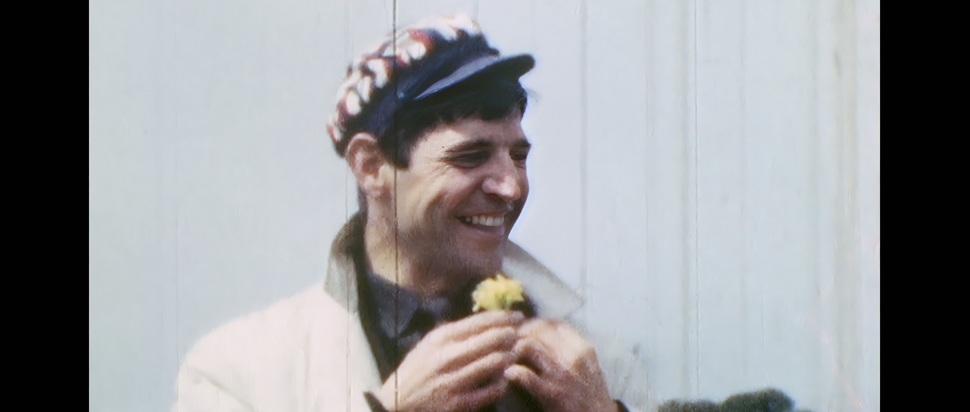Scotland on Screen: Jack Archer on Bill Douglas: My Best Friend
Jack Archer’s documentary Bill Douglas: My Best Friend explores the friendship between Scotland’s greatest filmmaker and his lifelong companion Peter Jewell through interviews and Douglas's unseen 8mm home films. Archer tells us more
Bill Douglas, Scotland’s greatest filmmaker, only completed a handful of films during his career. There’s ‘The Trilogy’, a trio of mid-length features based on his early life, titled My Childhood (1972), My Ain Folk (1973) and My Way Home (1978); his epic historical drama Comrades (1986); and several short films he made at the London Film School, which include his graduation film Come Dancing (1970). The body of work is small but the talent is ginormous. Despite his artistry, Douglas's work is still underseen in his home country, but new documentary Bill Douglas: My Best Friend, from director Jack Archer, should go some way to correcting that while also exploring Douglas's extraordinary friendship with his lifelong companion and collaborator Peter Jewell.
The film began when Glasgow-based production company Hopscotch Films were approached by Andy Kimpton-Nye, the filmmaker behind 2006’s Bill Douglas: Intent on Getting the Image, after he convinced Jewell to dig out Douglas’s unreleased home movies and short films. Archer describes these 20-plus shorts shot on 8mm films as “Douglas’s notebooks.”
“Some are just the two of them [Douglas and Jewell] larking about at the beach in Devon or in Venice, posing and looking cool,” explains Archer. “Others are Bill’s attempt at pastiching Hitchcock or surrealist films. There’s one called The Watercress File, which is his take on The Ipcress File. It’s a spy thriller set in London with toy guns. So on one hand, these are his sketches for things to come. On the other, these are movies where you can see how strong Bill and Peter's friendship is.”
We’re speaking to Archer at the 2023 Venice Film Festival, where Bill Douglas: My Best Friend is having its world premiere. The film making its bow here is important to Archer. After all, Douglas won the Silver Lion at the 1972 Venice Film Festival for My Childhood. “Some of the best footage Bill shot was his travelogue on his little 8mm camera, of him and Peter going around St Mark’s Square,” says Archer. “So, to come here, in his footsteps, it’s quite fitting in a full circle kind of way.
The documentary has a strong focus on Douglas’s bond with Jewell. “We didn’t say I love you to each other because it wasn’t said in them days,” Jewell says of their friendship. Archer notes though that this “friendship” is not a euphemism. “Most of Bill’s films deal with masculinity and male relationships in some ways, especially in Come Dancing, but Peter has been very clear over the years that they weren’t a gay couple. When the film says that they would read scripts in bed, it was two single beds because a single room was all that they could afford.”
Archer adds: “There was no kind of sexual element to their friendship but there was this kind of creative kinship that expressed itself in different ways.” As to why Archer chose to focus on Peter Jewell, he states: “[Peter] was the most important person to speak to. He shouldn’t just be another talking head, he should be the spine of the film.” Further, Archer mentions that “Peter introduced Bill to the literature of Gorky and Kafka, and Bill would talk about his life experiences with Peter. The fusion of these alongside Bill’s thirst for cinema became this powerful creative force.”
Archer first encountered Douglas’s work around 2012 and was struck by their humanity. “I was expecting a very harrowing, serious experience because that’s the way his films are often discussed in academic writing. They’re harrowing but they’re also incredibly beautiful.” Indeed, Douglas is often associated with Scottish miserabilism, a name given to Scottish filmmakers who deal with heavier, often tragic themes. “It’s a horrible concept,” Archer says of the term. “People apply it to the likes of Lynne Ramsay [who appears in the documentary] when those films are so much more than that.” Douglas himself wouldn’t have been a fan of this description, Archer reckons. “Bill was someone who never wanted to be put in a box,” he says. “He never wanted to be defined as a gay filmmaker for Come Dancing, nor as a Scottish, working-class filmmaker for My Childhood.”
As for what Archer wants from the doc, he says that “the intention was never to preach to the choir, but to find a new audience for people unaware of Bill’s work.” At the Venice premiere, Archer asked the audience to raise their hands if they had seen a Bill Douglas movie. “Only a handful put their hands up to say that they had seen one, which was gratifying because now those people can go and watch his films and hopefully be as moved by them as I am.” Archer is undoubtedly passionate about Douglas’s work, citing that “the best films have an enthusiasm for the subject that goes beyond the existing audience and I wanted mine and Douglas’s love for cinema to come across.”
Filmography: Bill Douglas: My Best Friend (2023), Orphans Reunited (2019), Bothy Life (2019), Village of Dreams (2018)
Bill Douglas: My Best Friend will be released later this year and Bill Douglas will be celebrated at both this year's Glasgow Film Festival and Glasgow Short Film Festival in March. Each year, GSFF awards the Bill Douglas Award to an international short film that reflects the qualities found in Douglas's work: honesty, formal innovation, and cinematic storytelling that places sound and image centre stage
